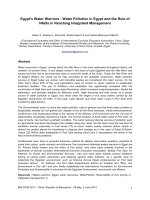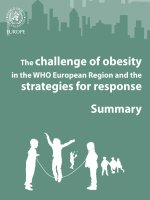SAICM and the Challenge of Chemicals Management
Bạn đang xem bản rút gọn của tài liệu. Xem và tải ngay bản đầy đủ của tài liệu tại đây (489.73 KB, 7 trang )
Content
SAICM and the Challenge of
Chemicals Management
October 6, 2012
Tetsuo Nishide
Director General
Japan Chemical Industry Association
• Environmental and Safety Issues of the
Chemical Industry
• Global Trend of Chemicals Management
Gl b l
d f Ch i l
• Chemicals Management Policies
Environmental and Safety Issues
of the Chemical Industry
•
•
•
•
Air pollution
Water pollution
Industrial waste and recycling
Gl b l
Global Environmental Issues
i
l
– Ozone layer depletion
– Climate change
• Chemicals management
• Bio‐diversity
Content
• Environmental and Safety Issues of the
Chemical Industry
• Global Trend of Chemicals Management
Gl b l
d f Ch i l
• Chemicals Management Policies
Change of the Nature of the
Environmental and Safety Issues
•
•
•
•
Black‐and‐white to gray zone
More focus on prevention
Relation of polluters and victims is not clear
Actions by specific polluters are not enough
•
•
•
•
•
Scientific approach
Combination of regulations and voluntary actions
Collaboration along the supply chain
Cooperation of the consumers
International framework
Adverse Effects of Chemicals to Human
Health and the Environment
•
•
•
•
Contamination of DDT
PCB problem
Seveso and Bhopal accidents
Endocrine disrupters
Endocrine disrupters
• Pressure to chemical companies
(Chemicals management throughout all life cycle
= Responsible Care )
Global Trend of Chemicals Management
1992年
UN Conference on Environment and Development; AGENDA 21
2002年
Chapter 19:6 program areas of chemicals management
(risk assessment, GHS・・・)
World Summit on Sustainable Development; Johannesburg Plan of Action
・minimize the adverse effects by 2020
・Implementation of GHS
2006年
1st International Conference on Chemicals Management(ICCM‐1)
2009年
ICCM‐2
Agenda21 Chapter 19
6 Programme Areas;
• (a) Expanding and accelerating international
assessment of chemical risks;
• (b) Harmonization of classification and labelling
of chemicals;
• (c) Information exchange on toxic chemicals and
chemical risks;
• (d) Establishment of risk reduction programmes;
• (e) Strengthening of national capabilities and
capacities for management of chemicals;
• (f) Prevention of illegal international traffic in
toxic and dangerous products.
SAICM adopted
EU
REACH
Australia
NICNAS
Emerging Issues
US TSCA
Reform
Canada
DSL
China,
Korea,
Asian
countries
Japan
Chemicals
Control Act
Mexico
ICCA
RC Global Charter
GPS (Global Product Strategy)
JCIA
Inventory
(SAICM:Strategic Approach to International Chemicals Management)
7
Implementation of
Agenda21 Chapter 19
• (a) Expanding and accelerating international assessment of chemical risks
OECD Test Guideline, HPV Program
• (b) Harmonization of classification and labelling of chemicals
GHS
• (c) Information exchange on toxic chemicals and chemical risks
Rotterdam Convention
Rotterdam Convention
• (d) Establishment of risk reduction programmes;
Basel convention, Stockholm Convention
• (e) Strengthening of national capabilities and capacities for management
of chemicals;
OECD & ICCA Workshop
• (f) Prevention of illegal international traffic in toxic and dangerous
products.
Rotterdam Convention
SAICM
Strategic Approach to International Chemicals Management
• Adopted by the International Conference on Chemicals
Management (ICCM) on 6 February 2006 in Dubai, United Arab
Emirates, the Strategic Approach to International Chemicals
Management (SAICM) is a policy framework to foster the sound
management of chemicals.
• SAICM was developed by a multi‐stakeholder and multi‐sectoral
Preparatory Committee and supports the achievement of the
goal agreed at the 2002 Johannesburg World Summit on
Sustainable Development of ensuring that, by the year 2020,
chemicals are produced and used in ways that minimize
significant adverse impacts on the environment and human
health.
• Progress in the implementation of SAICM was reviewed at the
second session of the ICCM held from 11 to 15 May 2009.
Johannesburg Plan of Action
・・・aiming to achieve by 2020 that chemicals are used
and produced in ways that lead to the minimization
of significant adverse effects on human health and
the environment using transparent science‐based
risk management procedure, taking into account the
precautionary approach as set out in Principle 15 of
the Rio Declaration on Environment and
Development.
・・・to develop a strategic approach to international
chemicals management until 2005
ICCM
International Conference on Chemicals Management
• ICCM‐1; February 2006 at Dubai
– Adopted SAICM(High‐level Declaration, Over‐
arching Policy Strategy, Global Plan of Action)
• ICCM‐2; May 2009 at Geneva
ICCM 2; May 2009 at Geneva
– Emerging Issues; nano, chemicals in product, e‐
waste, lead in paint
– ICCA hosted a round‐table discussion by CEOs
• ICCM‐3; September 2012 at Nairobi
– ICCA hosted a high‐level side‐event again
Organization of ICCA (October 2011)
Commitment of ICCA
(1990 ICCA started the ‘Responsible Care’ activities.)
General Assembly
Global Executive
Strategy Group
• Commitment to SAICM and ICCA’s voluntary actions
Board of Directors
Steering Committee
– RC Global Charter(2005)
– GPS (Global Product Strategy) (2005)
• To the global audience
– 2006 1st
Chemical Policy
h
l l
& Health LG
Responsible Care® LG
Communication LG
Leader: Stephen Pryer
(ExxonMobil )
Chair: Peter Cartwright
(Dow Corning)
Vice Chair : Y. Shiozaki
(Sumitomo Chemical)
Secretariat: ACC
Leader: not nominated
Co-chair: F. Humbert (Cefic)
Co-chair: A. Colton (ACC)
Secretariat: ACC
International Conference on Chemicals Management (ICCM-1)
• ICCA declared its commitment to SAICM by RC
RC global Charter and GPS
– 2009
Energy & Climate
l
Change LG
2nd International
Conference on Chemicals Management (ICCM-2)
Leader: K. Fujiyoshi (Mitsui Chemicals)
Chair: M. Iwamoto (Mitsui Chemicals)
Vice Chair : R. Mills (Dow Europe)
Secretariat: JCIA
Leader: Kurt Bock (BASF)
Co-chair : M. Kayser (BASF)
Co-chair: G. Bond (Dow)
Secretariat: BASF
• Progress report, exhibition, round‐table
– 2012 3rd International Conference on Chemicals Management (ICCM-3)
• ICCA is planning a CEO‐level side‐event
Trade Network
GPS
RC Global Charter
ICCM-2 Side-event at Geneva, May 2009
ICCM-3 at Nairobi, September 2012
Emerging Issues of ICCM
Global Trend of Chemicals Management
• Nanotechnology and manufactured nanomaterials
• Chemicals in products
• Electronic waste
• Lead in paint
• (Endocrine disruptors)
• Risk‐base management
ban → appropriate risk assessment & management
• Product stewardship throughout supply chain
one way → reciprocal communication
• Emerging issues
‐ nano material
‐ chemicals in product
Hazard Types (Example)
Chemical Risk to Human Health
●Physico‐chemical
‐ explosion
‐ flammability
‐ vapor pressure
●Toxicological
‐ acute
‐ sub‐chronic
b h i
‐ chronic
‐ mutagenicity
‐ reproductive toxicity
‐ carcinogenicity
●Ecotoxicological
‐ algae
‐ daphnia
‐ fish
Risk-base management?
How can we use chemicals appropriately,
direct contact
oral, skin・・・
Chemical
human
indirect contact through
air, water, food・・・
(hazard) X (exposure)
On assumption that it is
safe if we can keep the
exposure under some
limit
safe to human health and environment-friendlily?
Hazard analysis
Exposure analysis
(NOAEL, safety factor)
(including estimation)
=
(risk)
Content
• Environmental and Safety Issues of the
Chemical Industry
• Global Trend of Chemicals Management
Gl b l
d f Ch i l
Risk Assessment
Ways of use and
quantity through
supply chain
• Chemicals Management Policies
Examine the method of use and quantity limit, basing
upon the information concerning ways of use
Responsible Care
Responsible Care (RC) is a set of activities
aimed at preserving the environment and
ensuring safety and health in all stages of
chemical substance life cycles from
development and manufacturing to distribution,
use, final consumption, and disposal. (product
stewardship)
p)
RC is a Voluntary Initiative with company's
commitment to improve all aspects of
Environment, Health and Safety and to
communicate with the public about
activities and achievement to ensure
transparency on the following five
considerations.
Responsible Care Global Charter
Chapter 1 Adopt Global Responsible Care Core Principles
Chapter 2 Implement Fundamental Features of National Responsible Care Programs
Chapter 3 Commit to Advancing Sustainable Development
Chapter 4 Continuously improve and report performance
Chapter 5 Enhance the Management off Chemical
C
C
Products World wide – Product
Stewardship
Chapter 6 Champion and facilitate the extension of Responsible Care throughout the
chemical industry’s value chain
Chapter 7 Actively support national and global Responsible Care governance processes
Chapter 8 Address stakeholder expectations about chemical industry activities and products
Chapter 9 Provide appropriate resources to effectively implement Responsible Care
GHS
What is GPS?
Globally Harmonized System of Classification and Labelling of Chemicals
• Classification and labelling according to the
hazard of chemicals
• International harmonization
• UN Recommendation
d
July 2003
l
• UN GHS official document(purple); third
revised edition, July 2009
Strategic Elements of GPS
1. Develop global guidelines for Product Stewardship
2. Develop a management system approach
3. Define a tiered process for completing risk characterizations and risk
management recommendations for chemicals in commerce
4. Improve product stewardship cooperation with industry groups and
companies and address product challenges throughout the chemicals value
companies and address product challenges throughout the chemicals value
chain
5. Develop partnerships with inter‐governmental organizations and other
interested stakeholders
6. Make relevant product stewardship information available to the public
7. Participate in scientific inquiry to address new and emerging health and
environmental concerns
8. Develop a process to communicate internally and externally
9. Develop global advocacy principles
• 2006 1st International Conference on Chemicals
Management(ICCM‐1)
‐ Dubai Declaration
• ICCA launched GPS and RC Global Charter to
contribute to SAICM.
ib
SAICM
CEOs of major chemical companies signed the Charter.
• GPS is the framework to expand chemicals
management even to supply chain companies and
customers.
• GPS has the principles and method to implement.
Global Trend of Regulations of Chemicals
Each country revises regulations and/or introduces new
regulations to achieve the goal of WSSD2020.
RoHS Directive
REACH Regulation
CLP Regulation
R l ti
Chemicals Management
Program(CHP)
-Introduction or revision
of new chemicals
Revision of OSHA
registration system
(GHS)
-Introduction of GHS
Revision of CSCL
Revision of TSCA
Revision of OHSA
(Introduction of GHS)
ASEAN
Introduction of GHS
* Chemical Substances Control Law 28
28
日本無機薬品協会2011/11/16
2007 6/1 環境フォーラム
2010年12月21日
Trend of Chemicals Management in Asia
◆Each country introduce and develop the chemicals management
Timeframe of GHS Introduction in Asian Countries
◆East Asia moves faster.
2006
regulations to achieve the goal of SAICM.
Japan
CHINA
・RoHS Regulation (2007~)
・Order of the Ministry of Environmental Protection
(No.7) (2010~)
・GHS(2010~)
・Revision
Revision of Positive List of Food package(2009)
KOREA
・Revision of Toxic Chemicals
Control Law(2011~)
・GHS(2010~)
TAIWAN
・GHS(2009~)
・Revision of Industrial Safety
and Health Law(2011)~)
Industrial Safety and Health Law
Taiwan
Industrial Safety and Health Law
China
Dangerous Chemicals Control Law
2007
:Enforcement
2008
2009
Enforcement(Label/C, MSDS/V)
・GHS(2010~)
VIETNAM
Chemicals Law(2008~)
(Registration +GHS)
:Plan
2011
2012
SDS full compliance
Enforcement(MSDS, Label)
Revision of National Standard/MSDS, Label
Korea
Occupational Safety and Health Law
Enforcement(MSDS, Label)
Indonesia
Rule by Industrial Minister
THAILAND, MALAYSIA,
SINGAPORE, INDONESIA
2010
Enforcement(MSDS, Label)
Singapore
SS586(National Standard)
Enforcement(MSDS, Label)
Thailand
Hazardous Substances Act
Malaysia
日本無機薬品協会2011/11/16
Notification and Regulation Scheme of Environmentally
Hazardous Substances
Enforcement(MSDS, Label)
Enforcement(MSDS, Label)
30
Chemicals Registration Systems in Asian Countries
◆Level of chemicals management is different in each country
→ support must be adjusted to the situation of each country
→ comprehensive support including infra-structure is necessary
Establishmentt and operation of legal system
Japan
China
Korea
Malaysia, Vietnam, Taiwan
the Philippines
:Registration system existing
or in preparation
: No registration system
:Insufficient chemicals
management
Singapore, Thailand,
Indonesia, (India)
Cambodia, Laos,
Myanmar
ICCA:Members from Asia
Full member:
Japan; JCIA(1989~)
Korea; KOCIA(2008~)
Singapore; SCIC(2011~)
Gulf region; GPCA(2013~)
Observer member:
China; CPCIF, AICM(2010~)
Chinese Taipei; TCIA, PIAT, TRCA(2010~)
India; ICC(2011~)
Infra-structure (human resources, information, facility)
Implementation of GPS
Promotion of GPS/JIPS and GPS IT-Portal
(GPS IT-Portal became open to the public; October 2010)
• Implementation of Product Stewardship(PS)
– Preparing guidance documents
– Network of experts
• Making the base‐set safety information available
t th
to the public
bli
– Preparing and operating IT portal
• Capacity building for PS implementation
– Workshops in the developing countries
• Continue the basic scientific researches
– Implementation of Long‐range Research Initiative(LRI)
Outreach to Asian Countries
www.icca-chem.org/global-product-strategy
GPS/PS Workshop in Bangkok
• Japan-ASEAN Economic and Industrial Cooperation
Committee(AMEICC)
– Working Group on Chemical Industry(WGCI)
• Asia and Pacific Responsible Care Organization
–
–
–
–
Chairman; Mr. Yoshihara, JCIA
Tokyo conference; October 2009
Bali conference; October 2011
Singapore; conference July 2012
• ICCA/GPS Capacity Building
• Training courses on RC and Chemicals
Management by JETRO, AOTS, HIDA
Date:March 26-27, 2009
Sponsor: Federation of Thai
Industries(FTI)
Supporter:JCIA, Cefic
Participants:103
Asia Pacific Responsible Care Conference
October 2011 in Bali/Indonesia









